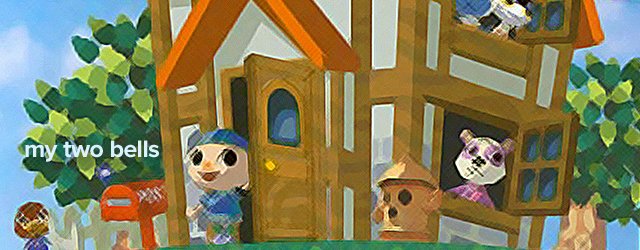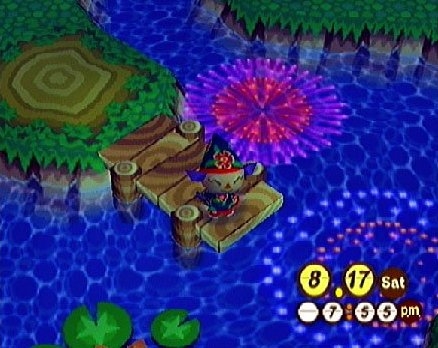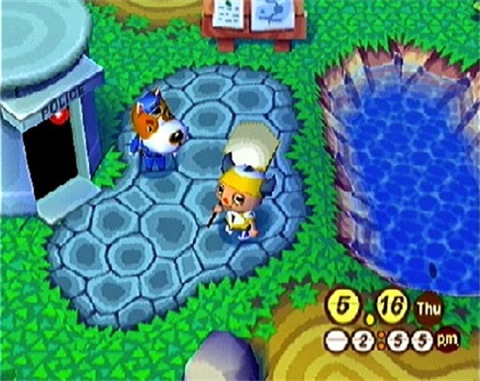
Despite being over a decade old, the Animal Crossing series is still very much in its infancy. Only three titles to bear its name have been released thus far (with a four installment looming on the horizon), but already the franchise seems to be stagnating. For many gamers (myself included), neither of the most recent installments was able to achieve the same success as the one released for GameCube, but the exact reason why has up to now eluded me. Having given the matter some thought, I have compiled a small list of some of the areas where I think the latest titles have faltered in the hopes determining just why I regard them less favorably than the original. You may notice, then, that this article will resemble more a litany of complaints than an objective analysis of the series’ transgressions, but I will endeavor to rationalize each of the following points as thoroughly and judiciously as possible.
The perspective
The “rolling log” effect employed by the last two entries in the series has its own charms, but I never found it as appealing as the original’s isometric viewpoint. This, I admit, is perhaps the most subjective of my criticisms, but it was one I felt deserved to be addressed nonetheless. Just why I feel this way is difficult to quantify, but it is in no small part due to the importance of the lake that stemmed from this approach. Before the sky was visible in the series, the only way to witness heavenly phenomena like the harvest moon or the meteor shower was to gaze at the reflection they cast upon the lake. This gave these events (particularly the harvest moon) an ethereal and mysterious beauty that was impossible to replicate outside of this perspective. With the inclusion of the sky in the later installments of the series, the lake’s significance was lost and the phenomena became comparatively bland.

It is easy to see why Wild World made the switch in perspectives– early in development it was decided the top screen would act as the sky, and the rolling log effect was the best way to facilitate this new viewpoint. City Folk, despite being designed for a single screen, retained this approach (even allowing you to see the sky in full with a tap of the D-Pad) and attempted to apply the original’s celestial light shows accordingly, but they felt far more removed and lost much of their mystique as a result. While the endeavor was by no means an abject failure (seeing a spontaneous aurora borealis in the midst of a late-night adventure is absolutely breathtaking), the original phenomena (and even the fireworks show) are nowhere near as entrancing as they once were because of this shift in perspectives, and the overall experience ultimately suffers for it.
The music
Wild World’s soundtrack certainly has its merits, but it took a decidedly different approach to background music than the GameCube effort. The handheld title favored much gentler melodies than its predecessor, but because of this, the soundtrack had a tendency to run together, and each hourly theme was largely indistinguishable from the last.
Animal Crossing on GameCube did not have this problem. Each theme was distinct in its own way, and the soundtrack ran the gamut of musical styles. Even when the themes did not seem entirely appropriate for the hour they represented, they never felt jarring, adding a nice ambiance to the different times of the day. This is particularly true for each of the early morning pieces. Rather than hear the expected aural tranquility, players who ventured forth into the small hours were greeted with some of the game’s catchiest and most unusual melodies. The rest of the soundtrack was just memorable, and it perfectly embodied the whimsy and the serenity of the entire experience.
The lighthouse
In the first Animal Crossing, the lighthouse was a standard fixture of every village. While its purpose was largely decorative, it added a quaint charm and a sense of history to your woodland hamlet. Wild World excised it completely to no detriment, but its implementation in City Folk is the real subject of my ire. As you may have guessed, my objection is not so much with the construct itself as with what it has come to signify. You see, City Folk ‘s lighthouse (or windmill, if that’s what you prefer) represents the series’ unsettling trend of adding more and more busy work at the expense of truly improving the core experience. It seems each subsequent iteration of Animal Crossing, aside from streamlining certain elements of the gameplay, has only expanded the catalog of collectibles for you to obtain without really enhancing the underlying design, and this is especially evident in the way City Folk introduces the “town fund.” Donating an absurd amount of Bells to finance construction programs is not increasing the longevity of the game; it is losing sight of what made it appealing in the first place, the freedom to delve into the experience as thoroughly or as casually as one pleased. I fully admit this can, to a certain degree, actually improve some facets of the title, but having to effectively pay for a (useless) feature that was available for free in the original is borderline extortionate and almost a little insulting to longtime fans of the series.
This is even more apparent when contrasted with a similar scenario from the GameCube title. If you may recall, early on in the game Tortimer begins planning the construction of a new bridge, the location of which will be based upon your input (verbal, not monetary). This project, simple as it may seem in comparison to the grandeur of a lighthouse, actually served a gameplay purpose, alleviating much of the effort spent navigating your village. Here you were given a convenient shortcut free of charge. In City Folk, you are expected to donate millions of Bells for a glorified lawn ornament.
The holidays and activities
Revisiting my GameCube village this past year has led me to the realization that, despite whatever technical advancements the series has seen since its debut, the first Animal Crossing still very much feels more lively than either of its follow-ups. This, I think, is in no small part due to the sheer amount of town activities available in that title. Every month features at least one noteworthy gathering in which you can participate, be they thinly disguised variations of major real world holidays (like the Harvest Festival) or completely fictional ones (like the spring and autumn Sports Fairs). Even when there was nothing of import going on in your town, the possibility of encountering a random character like Wendell or Gulliver (or a camper during the summer) made the game feel like it was bustling with activity at all times of the year.

Neither sequel, for their own reasons, could seem to recapture that same feeling. Wild World featured a list of new events tailor made for the title, so it was easy to view the game as a complement to the original rather than an outright successor to it. City Folk, on the other hand, looked to reconcile the two by incorporating the very best of each into a single experience, but it largely failed to transplant their charm along with them. Try as it may, the game could not replicate the sense of community so prevalent in the original, primarily because of how empty each gathering felt. Like its predecessor, City Folk featured a party for all of the major holidays, but where the first excelled was in the liveliness of these gatherings. Because a handful of villagers would join the festivities, the gatherings genuinely felt like important events. City Folk, by contrast, only had Tortimer in attendance per any given holiday, and they consequently lost much of their significance. The game did compensate with the ability to host friends during these special events, but given the niche appeal of the series (at least among gaming enthusiasts), this was no substitute for the sense of community felt in the original.
Tom Nook’s Raffle
With the advent of the Nook Point Tracking System, the need for a monthly raffle (in which special items are given away as prizes) has been greatly diminished. But while its purpose has been largely supplanted, I believe the game is weaker for its absence. Not only did the raffle days add another activity to the already-busy event calendar, they gave players the opportunity to receive items otherwise not available to them. These rare items could be obtained without having to spend an exorbitant amount of money for them (as they must with the Nook Point Tracking System), which in turn offered an incentive to purchase more than one may need, if only to receive additional tickets for the raffle.
There are also the larger implications of the Point Tracking System’s affect on gameplay. Much as the town fund, the program fosters not so much a desire to shop as it does a slavish obligation to purchase every item in the game. The results here are not quite as offensive as they are regarding town finances, but the franchise is in a precarious position because of its inclusion. Too easily can future installments succumb to the same design flaws that afflict City Folk, and the developers should be wary of treading down that path lest they further dilute the appeal of the series.
There are, I’m sure, a number of other reasons that I failed to mention, but I believe the ones listed here are an adequate summation of some of the original’s strengths over its successors. Feel free to provide some of your own reasons (or disagreements) in the comments section below!




 ShareThis
ShareThis







Hahah I would say the NES games alone make this the best version! That was the main reason I bought this back in 2002 and why I haven’t gotten any of the others.
TSK TSK. :p
I was thinking about including a section on NES games, but aside from the joy of actually finding one, I didn’t think they were all that important to the overall experience. I don’t personally mind their absence, but it would be nice to have Punch-Out again…
I agree to a certain extent with Kevin. I loved the Gamecube version but the handleld one was a better product in my opinion. What wild world did better than the other two was the introduction of animal pictures that the neighbors gave to you if you became their best friends. Those items were super hard to come by and actually made you care about the animals you lived with. Writing them letters actually had a useful purpose to it and they felt more like neighbors than statues repeating the same thing. Collecting those pictures was super awesome and you felt great accomplishment when you did receive one knowing all the time you put into befriending those animals was worthwhile. City Folk sucked monkey balls and Nintendo needs to realize this before they drive this awesome franchise to the ground.
I definitely agree. I hope I didn’t sound harsh toward Wild World because I really enjoyed it. It improved enough of the design (especially animal interaction) to really seem like a successor to the original instead of a mere retread. I especially liked that you could see which of your neighbors was trying to move and convince them otherwise. I do still prefer the first title (for the reasons outlined above), but WW was a great followup in my eyes.
City Folk, though, was pretty sad in almost every regard. I think from what little we’ve seen of the 3DS iteration it looks as though Nintendo’s learned its lesson, but that could just be coming from the optimist in me who loves the quaint charm the new benches and lampposts add to the game. XD
Thanks for reminding me of all the animal friends I’ve had over the years who’ve moved away from my AC:WW town, Kevin. Seriously, I needed a little extra depression in my life.